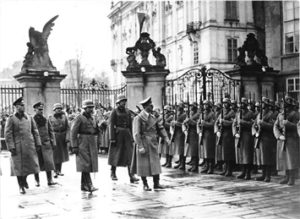The Outrage One Does Not Want
A Russian invasion of Ukraine would look like the kind of war that has been largely absent in the past 80 years and that was once common. It would involve a powerful nation setting out to expand its regional dominance by taking over a neighbor. A war like this — a voluntary war of aggression — would be a sign that Putin believed that Pax Americana was over and that the U.S., the European Union and their allies had become too weak to exact painful consequences.
–excerpt New York Times, by David Leonhardt, Feb. 21, 2022
I shudder to contemplate the massive number of certain deaths when the Russian army invades Ukraine. Many from Ukraine have immigrated and are American citizens. Reason suggests odds of

survival for family members remaining in Ukraine are poor.
Our father’s generation saw a similar style of military conquest in 1938. Hitler’s Wehrmacht invested all of Czechoslovakia on pretext of protecting about three million German speaking peoples who lived on the border with Germany. This invasion, the military subjugation of a small country was a pregame warmup for the Nazi military. The big event was soon to follow.
[Man] must assume his freedom
and not flee it;
He/she assumes it by a constructive movement;
one does not exist without doing something;
and also by a negative movement
which rejects oppression for oneself and others.
In construction, as in rejection,
it is a matter of reconquering freedom
on the facticity of existence,
that is, the given, which, at the start,
is there without any reason, as something willed by man.
A conquest of this kind is never finished;
the contingency remains, and, so that he may assert his will,
man is even obliged to stir up in the world
the outrage he does not want.
–excerpt, The Ethics of Ambiguity, by Simone de Beauvoir p. 170